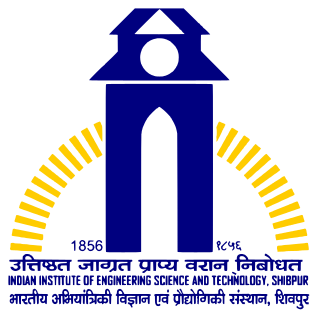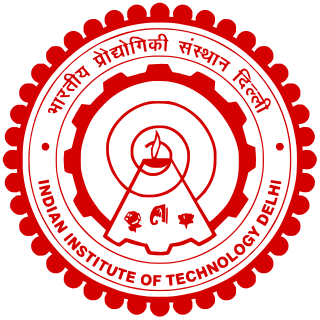
The Indian Institute of Technology Bombay is a public research university and technical institute in Powai, Mumbai, Maharashtra, India.

Indian Institute of Technology Roorkee is a technical university located in Roorkee, Uttarakhand, India. It is the oldest engineering institution in India, and was founded as the College of Civil Engineering in British India in 1847 by the Lieutenant-Governor of the North-Western Provinces, James Thomason, in order to train officers and surveyors employed in the construction of the Ganges Canal. In 1854 , after the completion of the canal and Thomason's death, it was renamed the Thomason College of Civil Engineering by Proby Cautley, the designer and projector of the canal. It was renamed University of Roorkee in 1949, and again renamed IIT Roorkee in 2001. The institution has 22 academic departments covering Engineering, Applied Sciences, Humanities & Social Sciences and Management programs with an emphasis on scientific and technological education and research.
The National Institutes of Technology (NITs) are centrally funded technical institutes under the ownership of the Ministry of Education, Government of India. They are governed by the National Institutes of Technology, Science Education, and Research Act, 2007, which declared them institutions of national importance and laid down their powers, duties, and framework for governance. The act lists 31 NITs. Each NIT is autonomous and linked to the others through a common council known as the Council of NITSER, which oversees their administration. All NITs are funded by the Government of India.

Indian Institute of Engineering Science and Technology, Shibpur, abbreviated as IIEST Shibpur is a public technological university located at Shibpur, Howrah, West Bengal, India. Founded in 1856, it is recognised as an Institute of National Importance under MHRD by the Government of India. It is controlled by the Council of NITSER. It is the fourth oldest engineering institute in India after College of Engineering, Guindy, IIT Roorkee, College of Engineering, Pune.

Indian Institute of Technology Dhanbad is a public technical university located in Dhanbad, India. IIT Dhanbad is an Institute of National Importance, and is ranked among the premier engineering institutions of India.

National Institute of Technology Durgapur, formerly known as Regional Engineering College, Durgapur, is a public technical university in the city of Durgapur in West Bengal, India. Founded in 1960, it is one of India's oldest technical universities. It is located on a campus of 187 acres (0.75 km²).

IIT Delhi, officially the Indian Institute of Technology Delhi, is a public institute of technology located in Delhi, India. It is one of the 23 Indian Institutes of Technology created to be Centre of Excellence for India's training, research and development in science, engineering and technology.
Chennai is home to many educational and research institutions. IIT Madras, located in South Chennai is considered as the premier centre of engineering education in India. Anna University and the University of Madras are the oldest state owned universities which are ranked among the best universities in India. The College of Engineering, Guindy and Madras Institute of Technology, which are the constituent college of Anna University along with Alagappa College of Technology are the pioneer institutes of engineering education in India. Some of the oldest medical colleges India, the Madras Medical College (1835) and Stanley Medical College (1938) are located in the city. Notable, liberal arts colleges in the city include Loyola College, Madras Christian College, Presidency College, Stella Maris College, Women's Christian College and Ethiraj College for Women.
In India, Institute of National Importance (INI) is a status that may be conferred on a premier public higher education institution by an act of Parliament of India for such institution which "serves as a pivotal player in developing highly skilled personnel within the specified region of the country/state". Institutes of National Importance receive special recognition, higher autonomy, and funding from the Government of India.

The National Institutes of Technology, Science Education and Research Act, 2007 was enacted by the Parliament of India to declare India's National Institutes of Technology (NITs), Indian Institute of Engineering Science and Technology (IIEST) and Indian Institutes of Science Education and Research (IISERs) as Institutes of National Importance. The former Act received the assent of the President of India on 5 June 2007 and became effective on Independence Day, 2007. The National Institutes of Technology, Science Education and Research Act, 2007 is the second law for technical education institutions after the Indian Institutes of Technology Act of 1961.

Indian Institute of Technology Bhubaneswar is a public technical university established by the government of India in 2008, located at Bhubaneswar, Odisha, India.

The Ministry of Education (MoE) is a ministry of the Government of India, responsible for the implementation of the National Policy on Education. The ministry is further divided into two departments: the Department of School Education and Literacy, which deals with primary, secondary and higher secondary education, adult education and literacy, and the Department of Higher Education, which deals with university level education, technical education, scholarships, etc.

Indian Institute of Technology, Hyderabad is a public technical research university located at Kandi Village of outskirts of the Sangareddy in Sangareddy district in the Indian state of Telangana. As with all Indian Institutes of Technology (IITs), IIT Hyderabad is an Institute of National Importance.

India has a publicly funded higher education system that is the third largest in the world. The main governing body at the tertiary level is the University Grants Commission, which enforces its standards, advises the government, and helps coordinate between the centre and the state. Accreditation for higher learning is overseen by 15 autonomous institutions established by the University Grants Commission (UGC).

The School of Planning and Architecture, Vijayawada is a higher education institute in Vijayawada, India, specializing in education and research in the field of urban planning and architecture. It is one of the three School of Planning and Architecture (SPAs) established by the Ministry of Human Resource Development, Government of India in 2008 as an autonomous institute and a fully Centrally Funded Technical Institution (CFTI). It forms part of the league along with the other two SPAs: SPA Bhopal and SPA Delhi.

The School of Planning and Architecture, Bhopal is a higher education institute in Bhopal, Madhya Pradesh, India, specializing in education and research in the field of Urban Planning, Architecture and Design. It is one of the two Schools of Planning and Architecture (SPAs) established by the Ministry of Education, Government of India in 2008 as an autonomous institute and a fully Centrally Funded Technical Institution (CFTI). It is one of the Institutes of National Importance of MoE India along with IITs, NITs and AIIMS. It forms a part of the league along with the other two SPAs: SPA Vijaywada and SPA Delhi. In 2014, Lok Sabha passed a bill to make all the three SPAs "centres of excellence" on the pattern of IITs and IIMs.
India has the largest numbers of engineers as well as the largest number of engineering education institutes and infrastructure in the world. As of 2021, India annually produces 1.5 million engineering graduates. India's technical education infrastructure includes 2500 engineering colleges, 1400 polytechnics and 200 schools of planning and architecture.

The National Institute of Technology Tiruchirappalli is a national research deemed university near the city of Tiruchirappalli in Tamil Nadu, India. It was founded as Regional Engineering College Tiruchirappalli in 1964 by the governments of India and Tamil Nadu under the affiliation of the University of Madras. The college was granted deemed university status in 2003 with the approval of the University Grants Commission (UGC), the All India Council for Technical Education (AICTE), and the Government of India and renamed the National Institute of Technology Tiruchirappalli.